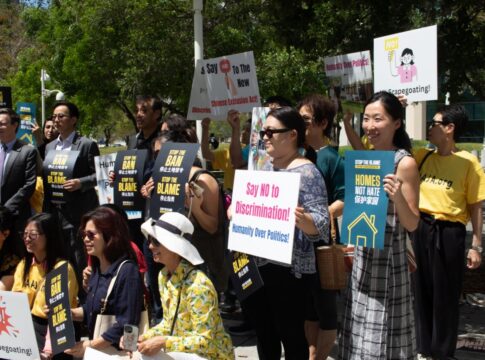
By Peter Shimamoto, Esq.
Guest Contributor
Chicago-based Aloha Poke Co.’s attempts to prevent other restaurants from using the name “Aloha Poke” has generated substantial controversy. Although there has been extensive discussion regarding whether Aloha Poke Co.’s actions are morally justified, there has been little, if any, serious analysis as to whether its position is legally valid.
To those unfamiliar with the background of the dispute, poke is a Hawaiian dish that has existed for decades. In 2016, Aloha Poke Co. began operations in Illinois and obtained federal trademark registrations for “Aloha Poke.”
The company’s attorneys subsequently sent cease and desist letters to other restaurants that also used “Aloha Poke,” alleging that they were infringing on their trademark. The letters demanded these restaurants “immediately stop all use of ‘Aloha’ and “Aloha Poke'” and destroy all materials containing those terms. At least two of the restaurants — one in Alaska and one in Washington — decided to comply with the attorneys’ request rather than risk expensive litigation. Both of those restaurants were owned by Hawaiians. Meanwhile, a restaurant in Honolulu, Aloha Poke Shop, refused to comply.
Aloha Poke Co.’s actions unleashed a wave of public backlash. In response to the criticism, the company took a page from Donald Trump’s playbook and issued a statement blaming the controversy on “a significant amount of misinformation” (i.e., “fake news”). The company asserted, among other things, that it had not told Hawaiian-owned businesses and Hawaiian natives to stop using the word “Aloha.” That assertion was false, as Aloha Poke Co.’s letter specifically demanded that the restaurants immediately cease using “Aloha” and “Aloha Poke” in connection with their businesses.
LATEST STORIES
Simply put, this poke chain’s position is not supported by trademark law. Trademarks are intended to protect brands that the owner has spent time, effort and money developing, and to prevent consumer confusion. Granting Aloha Poke Co. the exclusive right to use “Aloha Poke” does not further either goal. If the Midwest chain had truly wanted to develop its own brand, it could have chosen a name such as “Windy City Poke,” “Chi-Town Poke,” “Prairie Poke,” or many others. It elected not do so. Instead, it deliberately decided to use a term-“Aloha”-that already possessed a strong positive association; an association that had been created and developed over centuries by Hawaiians. Aloha Poke Co. therefore did not attempt to develop its own brand, but instead decided to appropriate an existing brand that had been created by others. APC is now using threats of litigation to attempt to prevent members of the very group that created the term from using it.
There are several grounds for prohibiting the company from obtaining trademark rights to “Aloha Poke.” One is a statutory provision, section 2(a) of the Lanham Act (the federal Act governing trademarks). Though rarely used, section 2(a) provides that matter that “falsely suggest[s] a connection with persons, living or dead, institutions, beliefs or national symbols” cannot be registered as a trademark.
Aloha Poke Co.s attempt to trademark “Aloha Poke” violates this statute because it falsely implies the restaurant chain is connected with Hawaii and Hawaiians. The company’s intent to create such a false association is confirmed by its pervasive use of Hawaiian images and terminology in its restaurants and marketing, such as surfboards, surfers, leis, grass skirts, beaches, palm trees, and shakas, and terms such as “ono grinds,” “kahuna,” “luau” and “mahalo.”
The trademark’s use of “Aloha” in connection with “poke” is particularly deceptive because poke originated in Hawaii. Since Hawaii is the birthplace of poke, the name “Aloha Poke” creates the impression that its restaurants are connected to Hawaii and serves authentic Hawaiian-style poke. Neither is true. Of course, “Aloha” and “Hawaii” are not the same word. However, Hawaii’s legislature has recognized that the state’s official nickname is “The Aloha State.” In addition, the public knows that “Aloha” is a Hawaiian word, and associates it with Hawaii. Indeed, that is precisely why the executives chose “Aloha” for its name.
Courts have frequently treated nicknames for individuals and organizations as equivalent to their formal names. For example, courts have found that “Keystone” refers to Pennsylvania (“The Keystone State”) and “Old Dominion” refers to Virginia. Similarly, a restaurant was prevented from using the name “Margaritaville” because it had no connection to Jimmy Buffett; a company that had no connection to Naples was precluded from using “Neopolitan” for sausage that had no connection to Naples; a company was prevented from registering “Baseball’s Evil Empire” as a trademark because the company had no connection to the New York Yankees; and “Protect and Serve” (the Los Angeles Police Department’s motto) could only be used as a trademark if the trademark applicant was connected to the LAPD.
Aloha Poke Co. therefore should not be allowed to use “Aloha Poke” as a trademark because it creates the false impression that the chain is connected to Hawaii and Hawaiians. At the very least, if its restaurants are allowed to use “Aloha Poke,” it should not be permitted to prevent other poke restaurants from doing so. This is particularly true in Hawaii, where thousands of business have “Aloha” in their names.
One final note: a federally-registered trademark becomes “incontestable” five years after its registration if it is continuously used during that time. Although incontestable trademarks can still be challenged, it is more difficult to do so. Thus, if anyone wishes to challenge the “Aloha Poke” trademark, they should do so within five years of the registration dates.
Peter Shimamoto is a graduate of Harvard Law School and is the managing attorney of Insignis Law, located in Los Angeles.








RE: Expert opinion: Can Aloha Poke be Trademarked: Many “flaws” in this article and this article is more “emotionally” stated than factually stated.. First and foremost, “Poke” is NOT an authentic hawaiian dish, I should know, I AM a KANAKA MAOLI. Poke as we know of today is in fact Japanese called “Chirashi” which WE native hawaiians have adapted and eventually called it ours. Let me simply this for you…native hawaiians ate fish and poi NOT fish and rice.
The authentic raw fish dish WE HAWAIIANS ate is called “i’a”, and NOT Poke.
Chirashi, is the scraps of fish left over and mix in with rice. Chirashi, was introduced in the late 1800’s by Japanese who came to hawaii to work at the Sugar Plantations, it essentially was a “poor man’s food”…
Also to note, the use of Lanham Act is moot for reasons that Poke is NOT a belief, nor is it a National Symbol. Also, this article FAILS on so MANY levels to reveal the thousands of Corporations and.or businesses who also trademarked native hawaiian names and/or culture for it benefit such as Aloha Shoyu, Aloha Maid, DaKine, Disney Aulani, Aloha Cookie Company, Aloha Macadamia Nut Co. and SO MANY OTHERS…please explain to me WHY is this article ONLY attacking 1 company????
ANSWER: Emotion and Bandwagon.
I think it safe to say that if you attack 1, you attack ALL. What a shameful and lack of any facts whatsoever in this article…
RE: Expert Oponion: Can Aloha Poke be Trademarked: Thank you for your insightful article, based on Mr. Blaisdell’s reply, it really made me consider things as a Hawaiian, like when do we claim things as our own? Take for example today’s “Hawaiian Plate- which consists of Lomilomi salmon, chicken long rice, poke, and most times the Okinawan sweet potato, these items are a constant yet they are not “Hawaiian”. Does that make it not our own? When I looked up the meaning of poke I found this definition:
poke
nvt. To slice, cut crosswise into pieces, as fish or wood; to press out, as the core of a boil (Kam. 64:105) or the meat of an ʻopihi shell; section, slice, piece. Poke heʻe, a severed portion of octopus; fig., a chubby person. Poke ʻina, the tongue-like meat found in the ʻina, sea urchin; to remove this meat.
I wonder when Ms. Puku’i and Mr. Elbert decided that fish would be included in this definition. Did it always include fish? or was it at some point in time included in the definition?
Thank you both for making me consider this, I am inspired to look into this.
RE: Expert Opinion: Can Aloha Poke Be Trademarked: Dear Mr. Blaisdell–Thank you for your comments. I have a few responses. First, poke is not the same as chirashi. Also, the name the Chicago company chose is “Aloha Poke”, not “Aloha Chirashi.” Second, the article never asserts that “poke” is a belief or a national symbol. Instead, as the article states, the section of the Lanham Act the article cites also includes people and institutions (i.e., Hawaiians and Hawaii). Finally, the article explicitly notes that there are thousands of businesses in Hawaii that use “aloha” in their names. The issue of whether “aloha” can be used as a trademark by anyone is a separate issue that would require a much lengthier analysis. The only issue this article addresses is whether the Chicago-based company is entitled to trademark “Aloha Poke” and preclude others, particularly Hawaiians, from using it.